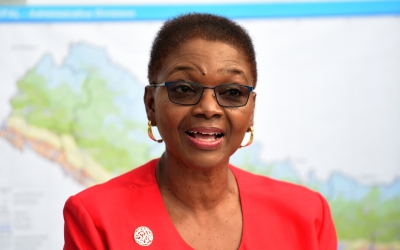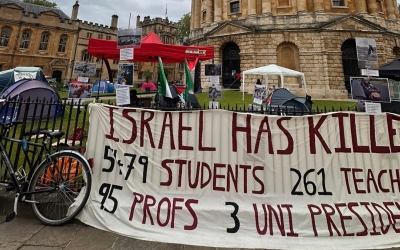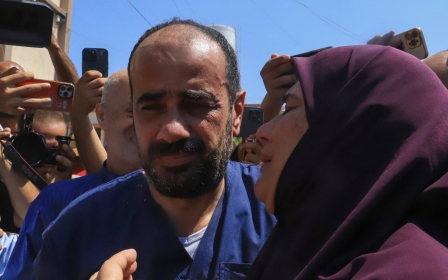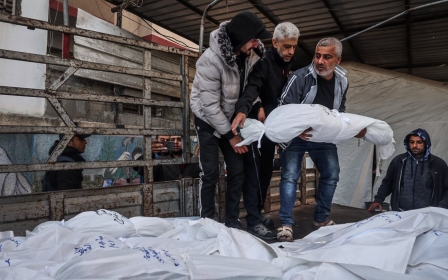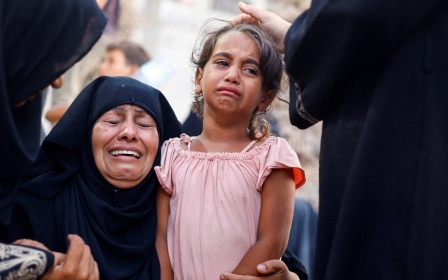UK elections: Gaza campus protesters find little hope in Starmer and Sunak
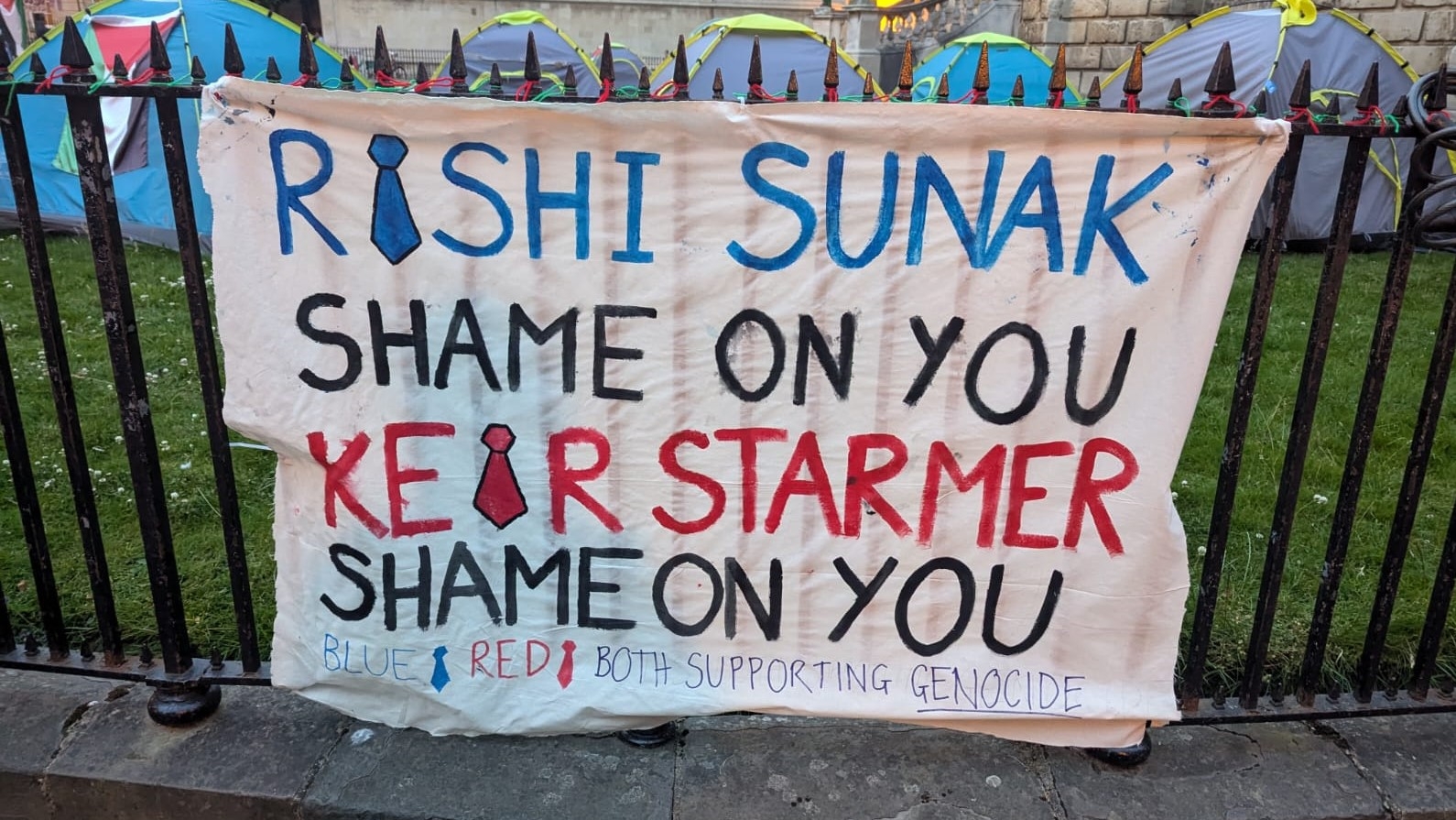
A report released last month by the Higher Education Policy Institute suggests that students could play a significant role in unseating dozens of Conservative MPs on Thursday.
With the general election taking place on 4 July, thousands of students will be returning home for the summer holidays, allowing them to vote either in their term-time address or in their parents' constituency. The report suggests that this could result in 35 seats switching hands.
Despite the student vote's apparent importance, neither the ruling Conservative Party nor the opposition Labour Party, which is expected to win a landslide, has provided much support or engagement.
When it comes to the issue dominating university campuses in recent months, Israel's assault on Gaza, both parties have been mainly outright hostile.
Abel is a student at the School of Oriental and African Studies (SOAS) in London, known for its radical politics, particularly regarding Israel-Palestine.
New MEE newsletter: Jerusalem Dispatch
Sign up to get the latest insights and analysis on Israel-Palestine, alongside Turkey Unpacked and other MEE newsletters
He and other students set up a "Liberated Zone" in May, laying out tents, banners and other temporary structures as part of a long-term campaign to raise awareness of the war in Gaza and pressure SOAS management to cut ties with Israeli institutions and the arms trade.
The university is located in Keir Starmer's constituency, who is likely to be the next prime minister. However, according to Abel, the only politician who has visited them has been independent candidate Andrew Feinstein.
"Anybody who's thinking about the genocide, thinking about the UK's complicity - no one wants Keir Starmer to be prime minister, you know," he told Middle East Eye.
Another student involved in establishing the camp, Haya, echoed Abel's views.
"I think the main thing is that we beat Keir Starmer, specifically since SOAS is his constituency," she said.
"I mean, we have Keir Starmer and Rishi Sunak. For us, we see them as the same... none of them have served their people.
"None of them have done anything for the Palestinian community, to advocate for Palestinian rights. Instead, they are continuing to be complicit in genocide."
'Demoralising'
None of the students who spoke to MEE wanted to use their full names, as concerns have mounted over crackdowns by university administrations.
Abel is currently facing disciplinary action over chants targeting Vice Chancellor Adam Habib, whom he accused of supporting the Israeli "genocide" in Gaza and running the university in a "singularly authoritarian way".
"Supposedly, sometime in the next 10 days, there should be a formal hearing, which I'll have the chance to answer to the allegations of personal abuse, harassment, physical misconduct, operational obstruction," he explained.
He was previously suspended, along with three others, for two months in October 2023 for what he described as a "very ordinary protest" against the war in Gaza.
This time, Abel could face expulsion.
Graffiti marking the walls of SOAS buildings leaves little doubt about the feelings of some protesters towards Habib, who was appointed in 2021.
One slogan reads, "Habib is a racist", while another says, "Blood on your hands, paint on your walls".
Student encampments have sprung up across the UK since Israel's war on Gaza began in October 2023, mirroring similar movements across the world.
In addition to raising awareness about the ongoing assault on Gaza, they have specifically campaigned for their universities to divest from financial and cultural interests in Israel and the occupied Palestinian territories.
There have been some successes: students at Swansea University pressured their administration to divest £5 million ($6.3m) from Barclays Bank, which campaigners say has £2bn invested in companies involved in supplying arms to Israel.
There have also been crackdowns: the encampment at the London School of Economics was forcibly dispersed last month following a court order, and several other camps are facing similar legal battles.
'I've never felt a stronger resolve not to vote Labour'
- Emily, Oxford student
The outcry over the bloodshed in Gaza has led to a groundswell of political activity among students, culminating in some of the largest public demonstrations London has seen since the anti-Iraq war protests in 2003.
Despite this, few hold hope for change from the British political class.
In the encampments and during demonstrations, both Starmer and Sunak are accused of facilitating a genocide in Gaza in the same breath.
At the Liberated Zone in the University of Oxford, there is little optimism that an incoming government will make any difference to the war in Gaza, which has seen at least 37,843 Palestinians killed and the enclave reduced to rubble.
"Either party that will lead the government has failed to call for a permanent and non-conditional ceasefire. Neither party has committed to recognising a genocide," said Rowan, a member of Oxford Action for Palestine (OA4P), which established the camp.
They told MEE that it was "demoralising" how this consensus has formed among the parties, with both trying to appear tough on disruptive protesters like Palestine campaigners or environmental groups such as Just Stop Oil.
"It feels like a lot of the campaigning on this issue has been people pointing at each other and saying: 'You're soft on protesters!' 'No, you're soft on protesters!'"
Another OA4P member, Emily, said she had previously been a Labour member under Starmer's predecessors, Ed Miliband and Jeremy Corbyn, but the current leader's comments on Kashmir, Black Lives Matter and now Palestine had driven her away.
"In the last local election that I had in my constituency, I showed up to the polling booth and spoiled my ballot, writing 'Free Palestine'."
"I've never felt a stronger resolve not to vote Labour."
'Hostile and toxic atmosphere'
Sunak has accused the campus encampments of fostering a “hostile and toxic atmosphere" for Jewish students and has backed police action against them.
Starmer has been keen to erase the legacy of his pro-Palestinian predecessor, Jeremy Corbyn, and resolve the controversy around antisemitism within Labour.
A manifesto pledge to recognise a Palestinian state has already been walked back over fears it could strain relations with the US.
Among the smaller parties, Gaza has been a more pressing concern. Although the Liberal Democrats, the third-largest English party, have primarily aligned with Labour and the Conservatives, parties like the Scottish Nationalist Party, the Green Party, the Workers Party of Britain, and various independents have taken stronger pro-Palestine positions or even made it a focus of their campaigns.
Despite their reservations, Rowan said members of the OA4P would likely vote for Layla Moran, the Liberal Democrat candidate for the Oxford West and Abingdon constituency.
Rowan noted that Moran, who is the only British-Palestinian voice in parliament and has family in Gaza, has been one of the few voices to consistently show solidarity with the Palestinians despite the group's reservations about the Liberal Democrats, a party of "prevarication and deference".
However, Emily, who lives in the same constituency, said she would be voting Green, citing the Liberal Democrats's participation in the 2010 coalition government, which pushed through legislation that removed many crucial support mechanisms for students and tripled tuition fees.
"I was tempted to vote for [Moran], but I was part of the generation of students that had maintenance grants scrapped," she explained.
'A crisis in the system'
Despite repeated threats from both the legal system and university administrations and the closure of 15 out of the 35 original Gaza encampments, those that remain promise to keep going well into the summer, regardless of the challenges.
The Oxford camp has remained steadfast despite repeated police incursions and a threat by the administration to seek a possession order if they are not cleared by 7 July.
At SOAS, there is little sign that the activists involved intend to wrap up their tents and go home.
Both Abel and Haya said the election had exposed the weaknesses of both university administrations and the broader political system in the UK.
"I think it goes to show how the Palestinian resistance is actually so powerful that if they're causing a crisis in the system here, even because of what they've done, because of the way they've shown the world," said Abel.
"The political system still is just like so incapable of showing basic humanity, you know, to oppose a genocide."
Middle East Eye delivers independent and unrivalled coverage and analysis of the Middle East, North Africa and beyond. To learn more about republishing this content and the associated fees, please fill out this form. More about MEE can be found here.


